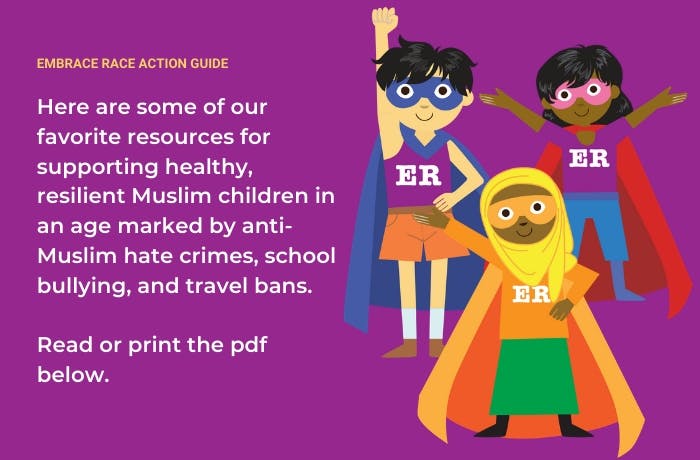How to be an ally to Muslim American families
by Zaiba Hasan and Uzma Jafri

We are two Muslim American moms who grew up in the U.S. before 9/11, raising Muslim American kids who have grown up in the shadow of 9/11 and the deep hostility directed by so many against Islam. We are also lifelong friends who started the Mommying While Muslim podcast as a forum to share strategies and offer support with our larger network of Muslim parents and non-Muslim allies.
What follows are some of our favorite resources for supporting healthy, resilient Muslim children in an age marked by anti-Muslim hate crimes, school bullying, and travel bans. These are tips both non Muslims and Muslims can use.
1) Prevent bullying by teaching kids to recognize how Islamophobia looks at school and what they can do about it.
A whopping 55% of Muslims students report being bullied about their religion! We recommend the Know Your Rights as Muslim Youth at School pamphlet, put out by the Council on American-Islamic Relations (CAIR) of California, for clear and concise advice on preventing and curtailing bullying against Muslim students.
2) Support and take advantage of education about Islam in your community.
Education is the means to eliminate suspicion and fear, for children and adults. Find your local Islamic Network Group (ING) chapter and invite a speaker to educate your community, house of worship, rotary club, or knitting circle about Islam. ING affiliates across the nation are also invited to public schools to provide secular education, not proselytization, as an adjunct to what geography, world religions, and other instructors are already teaching. They have many fantastic tools on their website, including a great frequently asked questions page and a project that tracks Islamophobia and who profits from it.
3) Have questions about Islam? Ask actual Muslims.
Unfortunately, misinformation about Muslims is proliferating. Simple solutions are often key. If you have a question about Islam, seek out perspectives from Muslims rather than relying on Google. If you don’t know Muslims to ask, It’s not hard to locate a masjid (mosque) near you, and most are welcoming to visitors. Get involved in local interfaith groups if you’re too shy to go it alone. You’ll inevitably meet Muslims elbow deep in work you care about, too, and their families will be a reflection of yours.
4) Consider going out for coffee rather than “doing drinks.”
Not all Muslims are the same, but a typical Muslim family won’t consume alcohol or pork. In general, making sure there are non-alcoholic, and vegetarian or vegan options is a great way to be inclusive of people with all kinds of dietary restrictions, whether Muslim or not. Paying attention to who you include or not and building an inclusive friend group for yourself and your children is key to raising inclusive kids.
Zaiba Hasan

Uzma Jafri



